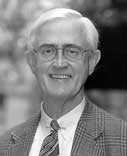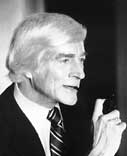Jon Cosovich
After a four-year struggle with Amyotrophic Lateral Sclerosis (ALS), Jon Charles Cosovich died on Jan. 24 at his home in San Francisco.

A former vice president for development, from 1983 to 1993, “He established a focus on higher-end fundraising; he really put us ahead of our time,” said Jerry May, current vice president for development, before the Board of Regents at their regular meeting Feb. 15.
Cosovich, who also served as deputy to the University president from 1993 to his retirement in 1998, is remembered fondly for his quick wit, affability and charm.
Those who worked closely with him will recall his affection for gardening, classic cars and boats, history and the arts. He also enjoyed traveling with his wife, Katharine “Timmie” Getchell.
Cosovich was born June 19, 1935 in Astoria, Oregon. He graduated from Stanford University in 1958 with a political science degree. As friends and colleagues can attest, Cosovich had an incisive analysis of the current political climate. He met his wife, Katharine, while attending Stanford; they were married in 1960.
In 1961 Cosovich began his career in university development at Stanford. Two decades later, he departed the west coast for the job as vice president for development at U-M in Ann Arbor.
From 1996 until months before his death, he served as senior advisor to the director of the Hoover Institution at Stanford, where he was reunited with many colleagues and friends. He also was a member of the Bohemian Club, Rotary, Ann Arbor Club, VPs and Detroit Athletic Club.
In addition to his wife, survivors include his son Charles, his wife, Kerry, and their children, Caroline and Grant of Burlingame, Calif.; son Peter, and his wife, Maureen, and their children Grace and Sophie of Phoenix, Ariz.; daughter Sarah of San Francisco; brother Peter of San Francisco; brother Alan of Seaside, Ore.; and brother-in-law Charles Getchell of Ipswich, Mass.
Donations in memory of Cosovich may be given to the University Musical Society, University of Michigan, Burton Memorial Tower, 881 N. University, Ann Arbor, MI, 48109-1011.
John Aldridge
John Aldridge, emeritus professor of English, passed away in Madison, Ga, Feb. 7. He retired from active faculty status Dec. 31, 1990, after a highly productive career as teacher and scholar.

Aldridge studied at the University of Chattanooga in his native Tennessee from 1940-43. He graduated from the University of California, Berkeley in 1947.
His service in the World War II was distinguished; an infantry rifleman and information specialist, he was decorated with the Bronze Star Medal and five bronze combat stars for Normandy, Northern France, Rhineland, Central Europe, and the Ardennes.
Having taught at the University of Wyoming and Sarah Lawrence College, he came to Ann Arbor in 1964 and remained until his retirement. He served as chairman of the editorial board of the Michigan Quarterly Review and, for more than a decade, as chairman of the Hopwood Writing Awards Committee.
When his book “After The Lost Generation” appeared in 1951, it was immediately hailed as the rallying cry of a new generation of novelists—writers such as Norman Mailer, Gore Vidal, Truman Capote and Paul Bowles. In his 1985 Introduction to the reissued text, Norman Mailer suggests, “Aldridge was the nearest guideline to absolute truth that the working novelist had in my young days. I wonder if there was ever a critic who understood any better the roots of the problems that best the novelists of his own generation.”
As critic and cultural arbiter, he remained in the forefront of the literary life of America. He wrote a novel, “The Party At Cranton,” and social commentary such as “In The Country of the Young.” His other works of literary criticism include such titles as “Time to Murder and Create,” “The American Novel and the Way We Live Now,” and “Classics and Contemporaries.” He was a regular contributor to such magazines as The Atlantic Monthly, Esquire and Harper’s, as well as a book commentator on The MacNeil-Lehrer news hour.
In his last years he continued to write—producing articles, book reviews and a memoir. Married five times and the father of five sons, he is survived by his widow Patsy Aldridge, who requests that donations in his memory be sent to the Hopwood Awards Program at U-M.
—Submitted by Nicholas Delbanco, Robert Frost Distinguished University Professor of English Language and Literature

